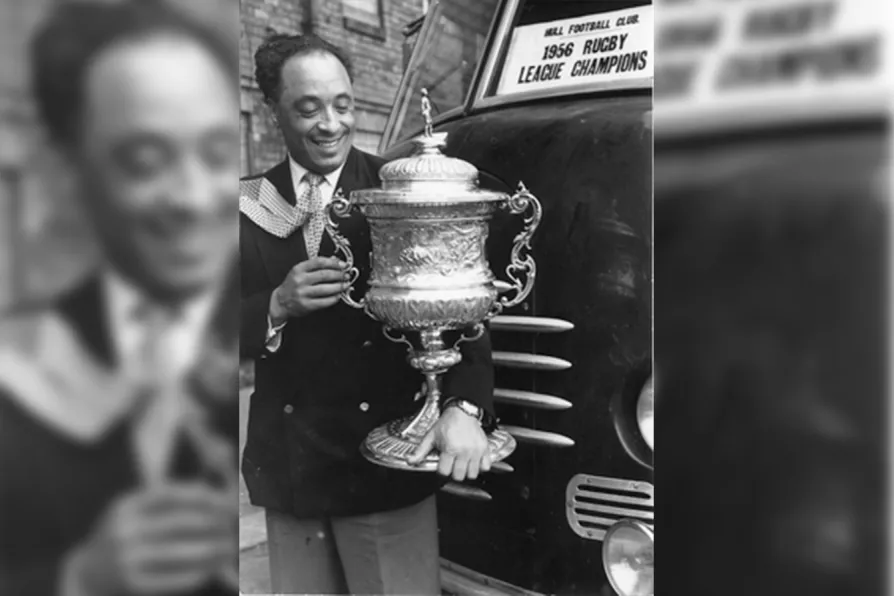TONY COLLINS highlights the career and struggles of Britain’s first black international rugby league player. A story that cuts through the myths about the ‘white working class’

 Roy Francis holding the Rugby League Challenge Cup in 1956
Roy Francis holding the Rugby League Challenge Cup in 1956
THE BRITISH working class has always been multiracial. Ever since the industrial revolution, workers of African, Asian, Jewish, Irish, Scottish, Welsh and English descent have lived and worked together throughout the towns and cities of Britain.
The idea there has ever been a ”white working class” is a racist myth, designed to divide workers and obscure the historical record of common struggle.
In sport, no-one demonstrates this better than Roy Francis, the first black British international rugby league player and the man who pioneered modern rugby coaching in the 1950s.
Roy was born into a black mining family in South Wales in 1919. His Trinidad-born father was one of dozens of black miners in the Welsh coalfields in the 1890s and 1900s.
Growing up in Wales at the height of the Great Depression wasn’t easy for Roy. He faced the twin scourges of racism and unemployment. But he was a gifted rugby player, and aged just 17, he left Wales to play professional rugby league for Wigan.
He wasn’t the first black Welsh rugby player to move north. It was an open secret that the Welsh rugby union authorities would not select black players for the national team, so star players like George Bennett and Alec Givvons also had to leave the Valleys to play international rugby league for Wales.
Roy’s father also left Wales in response to the 1919 racist riots which swept through Cardiff’s Tiger Bay, Newport and other dock areas in Britain. He went to the United States, where he became a leader of Marcus Garvey’s Universal Negro Improvement Association.
Roy became a rugby league star during World War II, after he had defied the army’s colour bar and enlisted shortly after the outbreak of war. In 1947, he reached the pinnacle of his playing career when he became the first black player to play for Great Britain.
In 1951, he was appointed coach of Hull rugby league club, the first black coach of any professional sports team in Britain. He was the only black person anywhere in Britain at that time who was in charge of a group of white people.
But his team of white dockers, fish trades workers and manual labourers had no problem accepting his authority. In fact, he was universally seen as a mentor and father figure.
He was also a brilliant coach, pioneering video analysis, scientific training, and sports psychology. Under him, Hull won two rugby league championships and appeared twice at Wembley in the rugby league cup final.
Off the field, he ran a cafe, which became a meeting place for young people of all races, and provided home comforts for young black players like Clive Sullivan, who went to captain the World Cup-winning Great Britain team in 1972.
But outside the team environments he created, Roy was often confronted with racism. He was turned out of hotels because of the colour of his skin, refused houses to live in, and even had his infant son disqualified from a beautiful baby contest because he was mixed race.
The suffocating grip of racism took its toll, and in 1961 he suffered a nervous breakdown. But his fierce determination to succeed against the odds could not be extinguished by prejudice.
In 1963, Roy moved to coach Leeds rugby league team, where he built one of the greatest sides in the club’s history. Yet again, his leadership and authority was automatically accepted by his young working-class team.
His success culminated in 1968 when, just weeks after Enoch Powell’s infamous ”Rivers of Blood” speech, Roy became the first black man to coach a team to victory at Wembley, when Leeds beat Wakefield Trinity 11-10 in the final second of the famous ”Watersplash” cup final.
Although he died in 1989, Roy Francis left a legacy that lives on today. Since Roy, rugby league has had many other black coaches at the top of the sport, most notably when Ellery Hanley coached the Great Britain team in 1994.
There is much still to be done to ensure racial equality in rugby league, and to fight racism throughout society, but Roy Francis’s extraordinary story both undermines racist stereotypes and highlights the long history of the multiracial working class in Britain.
Roy Francis, Rugby’s Forgotten Black Leader by Tony Collins will be published by Bloomsbury on June 5.










